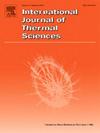A comprehensive review of heat pipes for the thermal management in proton exchange membrane fuel cells
IF 5
2区 工程技术
Q1 ENGINEERING, MECHANICAL
International Journal of Thermal Sciences
Pub Date : 2025-09-12
DOI:10.1016/j.ijthermalsci.2025.110269
引用次数: 0
Abstract
Proton exchange membrane fuel cells (PEMFCs) boast high power generation efficiency but still produce approximately 50 % of the energy as waste heat. Therefore, an effective thermal management system (TMS) is essential to ensure the safe and efficient operation of high-power PEMFC stacks. This work begins by elucidating the working principles of PEMFCs, the mechanisms of heat generation and transfer, and the coupled models of electrochemical and thermal characteristics. And then it summarizes the latest advancements in thermal management for PEMFCs. Among these, heat pipe cooling technology is gaining increasing attention due to its high thermal conductivity efficiency, temperature uniformity, and compatibility with fuel cells of various power ratings. This review introduces the basic structure and heat dissipation mechanisms of heat pipes, and provides a detailed classification of heat pipe cooling technology based on their structural characteristics and power requirements. It also critically evaluates the challenges of integrating heat pipes, including directional sensitivity, issues with integration into compact stacked structures, long-term reliability and low-temperature startup. In conclusion, this study identifies research gaps in the field and charts a course for future research on PEMFC thermal management strategies, particularly in heat pipe cooling technology.
质子交换膜燃料电池热管理用热管综述
质子交换膜燃料电池(pemfc)具有很高的发电效率,但仍然产生大约50%的能量作为废热。因此,一个有效的热管理系统(TMS)是确保大功率PEMFC堆叠安全高效运行的关键。本文首先阐述了pemfc的工作原理、热生成和传递机制以及电化学和热特性的耦合模型。然后总结了pemfc热管理的最新进展。其中,热管冷却技术因其导热效率高、温度均匀性好、可与不同功率的燃料电池兼容而日益受到人们的关注。本文介绍了热管的基本结构和散热机理,并根据其结构特点和功率要求对热管冷却技术进行了详细的分类。它还严格评估了集成热管的挑战,包括方向灵敏度、集成到紧凑堆叠结构中的问题、长期可靠性和低温启动。总之,本研究确定了该领域的研究空白,并为PEMFC热管理策略,特别是热管冷却技术的未来研究指明了方向。
本文章由计算机程序翻译,如有差异,请以英文原文为准。
求助全文
约1分钟内获得全文
求助全文
来源期刊

International Journal of Thermal Sciences
工程技术-工程:机械
CiteScore
8.10
自引率
11.10%
发文量
531
审稿时长
55 days
期刊介绍:
The International Journal of Thermal Sciences is a journal devoted to the publication of fundamental studies on the physics of transfer processes in general, with an emphasis on thermal aspects and also applied research on various processes, energy systems and the environment. Articles are published in English and French, and are subject to peer review.
The fundamental subjects considered within the scope of the journal are:
* Heat and relevant mass transfer at all scales (nano, micro and macro) and in all types of material (heterogeneous, composites, biological,...) and fluid flow
* Forced, natural or mixed convection in reactive or non-reactive media
* Single or multi–phase fluid flow with or without phase change
* Near–and far–field radiative heat transfer
* Combined modes of heat transfer in complex systems (for example, plasmas, biological, geological,...)
* Multiscale modelling
The applied research topics include:
* Heat exchangers, heat pipes, cooling processes
* Transport phenomena taking place in industrial processes (chemical, food and agricultural, metallurgical, space and aeronautical, automobile industries)
* Nano–and micro–technology for energy, space, biosystems and devices
* Heat transport analysis in advanced systems
* Impact of energy–related processes on environment, and emerging energy systems
The study of thermophysical properties of materials and fluids, thermal measurement techniques, inverse methods, and the developments of experimental methods are within the scope of the International Journal of Thermal Sciences which also covers the modelling, and numerical methods applied to thermal transfer.
 求助内容:
求助内容: 应助结果提醒方式:
应助结果提醒方式:


